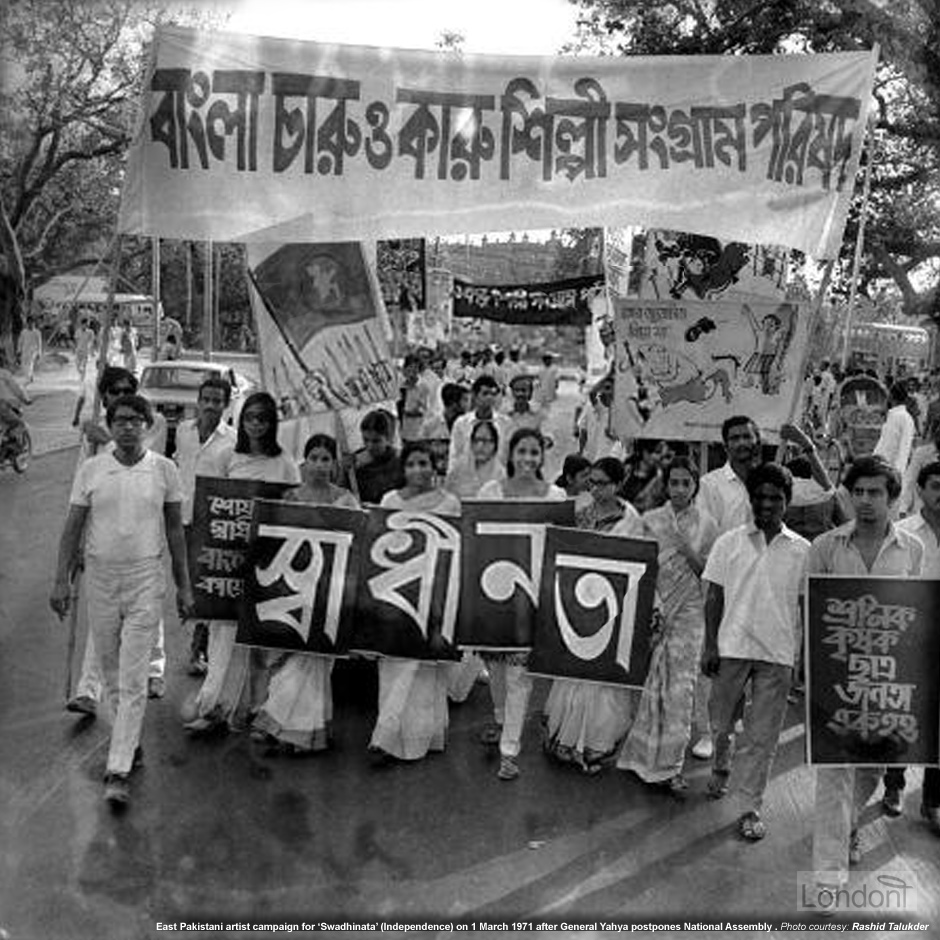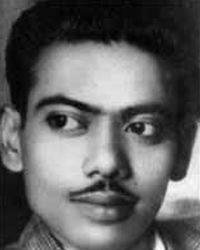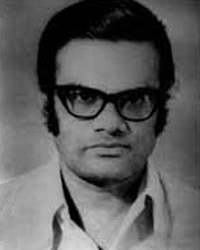
Fight on the cultural front
Last updated: 5 October 2017 From the section 1971 Muktijuddho
While Bengali valiant soldiers and freedom fighters fought the war on the battlefield, Bengali journalists, educationists, film makers, singers, actors, cultural activists, civil servants and administrators confronted the challenges in their respective areas.
Some of the people who made invaluable contribution include:
Dr. Mazharul Islam, Abdul Gaffar Chowdhury, Prof. Abdul Hafiz, Abu Toab Khan, Dr. A. R. Mallick, Dr. Ajay Roy, Dr. Anisuzzaman, Badrul Hasan, Faiz Ahmed, Gaziul Haque, Mahadev Saha, Dr. Mahmud-ul-Islam, Mahboob Talukder, Mujib Bin Haque, Nasima Chowdhury, Nawjesh Hossain, Nirmalendu Gun, Ranesh Das Gupta, Dr. Sarwar Murshed, Satyen Sen, Shanjida Khatun, Shawkat Osman, Sikander Abu Jafar, Syed Ali Ahsan (translated Robindronath's 'Amar Shunar Bangla' national anthem into English), Umme Kulsum and Wahidul Haque
Their stories, articles, dramas, poems and songs inspired the people to fight courageously.
There are nevertheless thousands of other silent contributors whose valiant efforts are yet to be recognised and recorded.

'Stop Genocide' by the missing filmmaker Zahir Raihan
During April-May 1971 award-winning filmmaker Zahir Raihan came up with the concept of making a film on the Bengali genocide carried out by the Pakistani army. However, the Motion Picture Association of Bengal didn't take it seriously at first. Finally, Zahir Raihan convinced them and 'Stop Genocide' was made.
It is a 20-minute short, black-and-white documentary narrated in English. The main theme of the film was the brutality of the genocide and the apathy and the struggle of the migrated general public. The language was simple and appealing and the film was produced in less than a month.
Film Director Alamgir Kabir provided the narration whilst editing was done by Debabrata Sen Gupta.
Raihan was a refugee staying in Kolkata when he made this film.
 Zahir Raihan (1935 - 1972) A leftist activist and writer
Zahir Raihan (1935 - 1972) A leftist activist and writer Alamgir Kabir ()
Alamgir Kabir ()  Debarata Sen Gupta ()
Debarata Sen Gupta ()
Zahir Raihan had a completely neutral angle in this regard: he was more willing to project the real picture of the genocide than the political affiliations of the war for creating more effective opinion.
On its first screening at a secret place in India, the cabinet of Mujibnagar Government including Acting President Syed Nazrul Islam, Prime Minister Tajuddin Ahmed, AHM Kamruzzaman and the politicians present there became totally emotional. The film also helped us gain the Indian support in the Liberation War.
Zahir Raihan introduced a new technique of film-making by using video clips, newsreel and photographs which he found whilst making this documentary.
It is considered one of the top ranked documentaries ever made on war. The film proved to be a powerful medium to gather international support for the liberation of Bangladesh and create world opinion against the brutal acts committed by Pakistan Army.
Stop Genocide is the first alternative movie of our country. It also moved the [provisional Mujibnagar] government to fund three other short documentaries in June 1971 to gather worldwide support against Pakistan - Liberation Fighters (directed by Alamgir Kabir), Innocent Millions (directed by Babul Choudhury), and A State is Born (directed by Zahir Raihan).
Zahir Raihan made politically conscious movie even before the war had started. He wrote, produced and directed the full-length movie "Jibon Theke Neya" which was released in 1970. This timeless movie reflects the anti-Pakistani movements of late 1960s and is dedicated to the Basha Andolan of 1948-1952. It was the first ever film which called for independence though in a symbolic way.
This is the film that moved the nation, and the strength of film as a medium of communication was proved for the first time in this soil.
Morshedul Islam, a filmmaker
Zahir Raihan disappeared on 30 January 1972 whilst trying to locate his brother, the famous writer Shahidullah Kaiser, who was captured and killed by the Pakistan army and/or local collaborators during the last days of the war. He was only 36 years old.
Films on Bangladesh Liberation War
During or pre-liberation:
- Jibon Theke Neya (1970), Stop Genocide (1971), and A State is Born (1971) by Zahir Raihan
- Joy Bangla by Uma Proshad Moitro
- Joy Bangladesh by I.S.Johor
- Nine Months to Freedom by S. Shukdev
- Dateline Bangladesh by Gita Mehta London
- Liberation Fighter by Alamgir Kabir
- Innocent Millions by Babul Chowdhury
- Khaled Musharraf War by Granada TV
Post-liberation:
- Ora Egarojon and Songram (1974) by Chashi Nazrul Islam
- Orunodoyer Ognishakkhi by Shubhas Dutta
- Bagha Bangali (1972) by Ananda
- Roktakto Bangla (1972) by Momtaj Ali
- Dhire Bohe Meghna (1973), Rupali Soikat, Ek Sagor Rokter Binimoy, Progrom in Muktajuddha, Toward Bangla by Alamgir Kabir
- Abar Tora Manush Ho (1973) and Ekhono Onek Raat (1997) by Khan Ataur Rahman
- Amar Jonmobhumi (1973) by Alamgir Kumkum
- Alor Michhil (1974) by Narayan Ghose
- Megher Onek Rong (1976) and Amra Tomader Bhulbona by Harunur Rashid
- Kalmilata (1986) by Shihidul Haque
- Ekattorer Jishu (1993) by Nasiruddin Yusuf
- Aguner Parasmani (1994) and Shaymol Chhaya by Humayun Ahmed
- Nadir Nam Modhumoti (1995), Hooliya and Smriti ’71 by Tanvir Mokammel
- Slogan by Kabir Anwar
- Surjo-Grohon by Abdus Samad
- Kaar Hashi Ke Hashe by Ananda
- Badhon Hara by A. J. Mintu
- Chitkar by Matin Rahman
- Banglar 24 Bochhor by Mohammad Ali
- Allah Meherban by Mohsin
- Cry for Justice by Bashirul Haque and Shahriar Kabir
- Agaami, Suchona and Sorot ’71 by Morshedul Islam
- Protyaborton by Mostafa Kamal
- Dhushor Jatra and Aborton by Abu Sayeed
- Chakki and Potaka by Enayet Karim
- Duronto by Khan Akhter Hossain
- Ekjon Muktijoddha by Dildar Hossain
- Nil Dangson by Suman Ahmed
- Bighaate by Habibul Islam
- Muktir Gaan, Muktir Kotha and Women & War by Tarek & Catherin Masud
- Sei Rater Kotha Bolte echechhi by Kawsar Chowdhury
- Silalipi and Itihaas Konna by Shamin Akhter
- Ami Shadhinota Anechi by Sagar Lohani
- Joy Jatra by Towkier Ahmed
- War Babies by Denny Henke of Macumba International, Inc.
- Genocide Factor by Robert J. Emery of Media Entertainment Inc
- Durnta Padma by Duga Prosad (India)
- Bangladesh Diary', Joy Bangla, The Golden Land of Bengal and Legacy of Blood [Partition of Pakistan] by Nagisa Oshima

